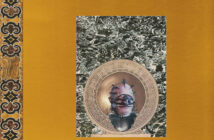
Before I’d even listened to this third album from Copenhagen-based electronic producer Anders Trentemoller, I’d already heard from several other writers that it represented an unexpected new direction for him. As a longtime listener though, I personally felt that the signs indicating this sort of progression were always there. While he certainly built his reputation around crafting highly-detailed techno for the likes of Poker Flat, Trentemoller’s 2006 debut album ‘The Last Resort’s often appeared more preoccupied with icy downbeat minimalism than the dancefloor. If anything, his preceding 2010 album ‘Into The Wide Yonder’ gave the most clues as to where Trentemoller was heading next, offering up a dense and cinematic collection that saw an increasing focus on vocals and live instrumentation. Three years on, this third album ‘Lost’s sees Trentemoller continuing to progress in a similar direction, but where ‘Into The Wide Yonder’ was billowing and filmic, this latest album sees the Danish producer far more oriented towards actual songs. It’s partially the result of a predominant focus on vocals, with an enviable cast of collaborators including Low, Kazu Makino of Blonde Redhead and Sune Rose Wagner of The Raveonettes contributing to tracks here.
While stacking the tracklisting with high-profile guests is often a recipe for warning signs, the results here turn out to be consistently inspired – indeed, this is certainly no uneven UNKLE-style exercise. Some of the best moments here such as Mimi Sparhawk’s haunting vocal appearance on the gorgeously wafting and downbeat ‘The Dream’ even manage to transcend their component parts, resulting in something altogether ‘bigger’ than what you’d simply expect from the artists involved. There’s noticeably more of an emphasis upon indie-centric guitars being incorporated into Trentemoller’s sonic palette here as well, with the Ghost Society-fronted ‘River Of Life’ in particular fusing a flickering synth-line with jagged post-punk guitars, resulting in a collision that’s not dissimilar to US darkwavers The Soft Moon. While it’s tempting to focus on what’s different here though, many of the hallmarks that have always been present in Trentemoller’s work are still the same here – indeed minus the gothy Bauhaus-styled bassline that propels it, the highly-textured tech-house rhythms that power the moody ‘Still On Fire’ could have featured on any of the ‘peaktime’-oriented remixes he’s done for other artists. There’s simply way too much going on throughout this excellent third album to take in during a single listen, and that’s probably exactly the way Trentemoller wants it.



